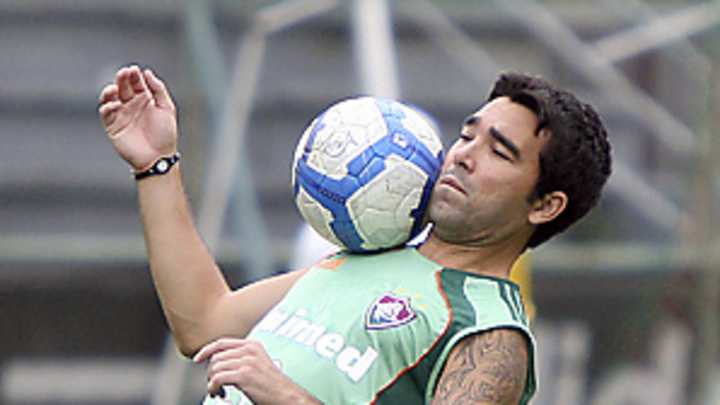Brazil league draws to close with some fans rooting for opposition

Luiz Felipe Scolari rated it as the saddest day of his coaching career. Last week the World Cup winning coach, now back in his native Brazil with Palmeiras of Sao Paulo, saw his side suffer an unexpected and painful defeat. In the semifinal of the South American Cup, the continent's Europa League equivalent, Palmeiras had won the away league 1-0 against compatriots Goias. They looked a safe bet for the final, especially when they took the lead in the return game. But Goias struck twice to go through on the away goals rule.
The elimination effectively ended Palmeiras' year. But there was still pride to play for in the final two rounds of the Brazilian Championship. The fans would surely expect a reaction and a strong performance last Sunday when the team hosted Fluminense.
Not a bit of it.
In the days leading up to the game groups of supporters went to Palmeiras training ground to press home the message that the players had an obligation to lose. During the match the fans behind the goal hurled abuse at their own goalkeeper Deola whenever he made one of a series of excellent saves. The supporters genuinely wanted the ball to end up in the back of their own net. What on earth is going on?
The explanation lies in the fact that, although the country is the size of a continent, soccer in Brazil continues to revolve around local rivalries. There has only been a genuine national championship since 1971. From mid January to mid May, the clubs still dispute the State Championships, one for each of the 27 states that make up this giant land. This creates a mentality whereby, for many fans, if his own team cannot win the title, then the most important thing is that the same fate befalls his local rivals.
A third club, Cruzeiro of Belo Horizonte, have an outside chance of winning this year's Brazilian Championship. But with one round to go it is basically a two horse race between Fluminense of Rio and Corinthians of Sao Paulo. Corinthians and Palmeiras are historic local rivals -- which explains why many fans of Palmeiras were happy to see their team lose to Fluminense since such a result makes it harder for Corinthians to be crowned champions.
Indeed, Fluminense's 2-1 victory keeps them one point in front, and means that a win on Sunday at home to already relegated Guarani will guarantee them the title.
Fluminense found themselves in a similar position the previous week, away to Sao Paulo FC, another local rival of Corinthians. For this game both sets of supporters sat in harmony, cheering together as Sao Paulo had two men sent off and Fluminense won a 4-1 victory.
Corinthians may also have benefited from taking on opponents whose level of motivation may not have been quite at its highest. Last week they were at home to Vasco da Gama of Rio. Before the game some Vasco players questioned why they should have to run to sweat out a result which would benefit their local rivals Fluminense. In the event, Vasco succumbed to a tame 2-0 defeat.
These bizarre events are causing some in Brazil to question the league format, where all 20 teams play each other home and away. Introduced in 2003, this replaced the previous playoff system.
The league has the advantage of keeping all the clubs in activity for the duration of the championship, and also of rewarding the teams which manage to stay consistent throughout the campaign. But those who prefer the playoffs miss the excitement generated by having a big final at the end of the campaign -- and also point to these recent events where fans have been happy to see their team lose, where the closing stages of the championship are contaminated by what financial experts call "moral hazard."
It is perhaps being overlooked that the problem of moral hazard can also surface in the playoffs. In this format the knockout stages are always prefaced by some sort of league, to establish which teams progress and which are eliminated. A situation could arise in which fans want their team to lose in order to ensure that local rivals fail to qualify for the playoffs.
One proposal being debated in Brazilian soccer circles is as follows; retain the league format, but maintain the integrity of the competition by ensuring that the big local derbies are played in the final matches. The rivalry between, say, Palmeiras and Corinthians would always ensure a competitive game. This might be worth considering -- although hopefully only as a short term measure. It makes no business sense. A big local derby should guarantee a big crowd at any stage of the season. But a game which might on face value have little appeal -- such as this Sunday's match between Fluminense and Guarani -- can become a sell out because the clubs' position in the table makes it important.
In the long term it is surely preferable to encourage the growth of values which render uncompetitive games unthinkable.
Manchester United boss Alex Ferguson argues that for a player, every game is s statement of his own worth. This is the basic standard of professionalism to which all players should aspire -- merely representing the colors of their club should be motivation enough.
And as far as the fans are concerned, a change in values is urgently needed. Taking more pleasure in the failure of another than in one's own success is an illustration of an alarming poverty of spirit.
